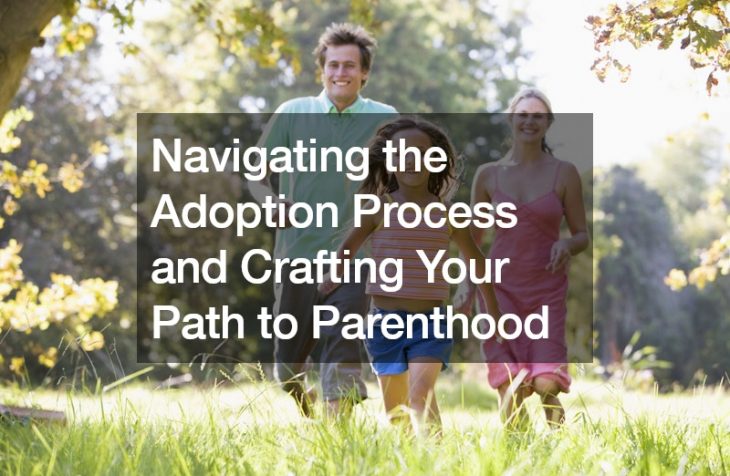Navigating the Adoption Process and Crafting Your Path to Parenthood

Adopting a child is both a deeply rewarding and highly complex process. For individuals or couples considering adoption, it’s essential to understand the technicalities involved and to prepare themselves for the road ahead. From initial expressions of interest to final adoption orders, the path to parenthood through adoption requires patience, resilience, and a clear understanding of the steps involved.
Expression of Interest
The journey begins with an expression of interest in adoption. This initial step involves completing forms and providing essential information to the relevant authorities.
This data is used to assess eligibility and determine whether prospective adoptive parents meet the necessary criteria. It’s crucial to understand that this process is thorough and rigorous, with no shortcuts available.
Assessment and Selection
Once an expression of interest is lodged, prospective adoptive parents may be selected for assessment. This selection is based on various factors, including the needs of children awaiting adoption. Couples may undergo a series of assessments designed to ensure that prospective parents are equipped to provide a safe and loving environment for a child.
Health checks ascertain the physical well-being of individuals, while background checks delve into their personal histories to ensure the safety and welfare of the child. Interviews provide an opportunity for prospective parents to articulate their motivations, aspirations, and preparedness for parenthood. Through these assessments, adoption agencies and authorities aim to make informed decisions that prioritize the best interests of the child.
Intercountry Adoption
For those considering intercountry adoption, additional steps and considerations come into play. This may involve navigating the requirements and procedures of overseas adoption authorities, including additional costs such as translation fees and travel expenses. Each intercountry adoption program has its own set of fees and requirements. Therefore, prospective adoptive parents must familiarize themselves with the legal and regulatory frameworks governing intercountry adoption in both their home country and the country from which they plan to adopt.
Placement Proposals
After successfully completing the assessment process and obtaining approval, prospective adoptive parents may receive placement proposals. These proposals provide detailed information about the child awaiting adoption. From the child’s background and history to their unique needs and preferences, placement proposals offer prospective parents valuable insights into the child they may potentially welcome into their family.
Upon receiving placement proposals, prospective adoptive parents are encouraged to approach the decision-making process with care and thoughtfulness. It is essential for them to thoroughly evaluate the information provided in the proposals and assess whether they have the capacity to meet the child’s needs effectively. Factors such as the child’s age, health status, and any special requirements must be carefully considered to ensure a successful placement.
Adoption Orders
Upon acceptance of a placement proposal, prospective adoptive parents may become the child’s prospective adoptive parents under an interim adoption order. This marks the beginning of a period of custody, during which the child’s well-being and interests are assessed. After a minimum period of 12 months, a final adoption order may be granted, legally establishing the adoptive parents as the child’s sole guardians. This finalization process typically involves proceedings in accordance with family law, ensuring that the adoption is legally recognized and binding.
Adoption Plans
In some cases, adoption plans may be established to support the child’s well-being and best interests. These plans are agreements between birth parents and adoptive parents and may include provisions for ongoing contact or support. Adoption plans may encompass a wide range of considerations, including visitation schedules, communication channels, and financial support arrangements. While adoption plans are not legally enforceable, they serve as a valuable tool for ensuring that the child’s needs are met.
Supervision and Support
Even after the finalization of adoption orders, support and supervision may continue for a period of time to ensure that the child’s well-being is maintained. This post-adoption period involves a range of supportive measures aimed at assisting the adoptive family in their transition and adjustment process. Regular check-ins and assessments are conducted by adoption agencies or social workers to monitor the family’s progress and address any challenges that may arise. These check-ins serve as an opportunity to evaluate the family’s dynamics, assess the child’s integration into their new environment, and identify any additional support needs.
Preparing for Parenthood
Throughout the adoption process, prospective parents are encouraged to actively engage in preparations for parenthood. This may involve a multifaceted approach aimed at equipping prospective parents with the knowledge, skills, and support systems necessary for successful parenting. One essential aspect of preparation involves participating in adoption preparation courses, which provide valuable insights into the unique dynamics and challenges of adoptive parenting. These courses cover a wide range of topics, including attachment and bonding, cultural sensitivity, and trauma-informed care.
Besides formal education, prospective parents are encouraged to seek out counseling or support groups tailored to the needs of adoptive families. These forums provide a safe and supportive space for prospective parents to share their experiences, seek guidance, and build connections with others who are on a similar journey.
Closing Thoughts
Navigating the adoption process requires dedication, patience, and a willingness to embrace the journey. By understanding the steps involved and preparing themselves for the challenges ahead, prospective adoptive parents can craft their path to parenthood and open their hearts and homes to a child in need.
.

